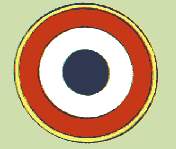 The Armee de L'air
The Armee de L'air
1960 budget reduced the strength of the Armee de L'air to 35 squadrons and 660 a/c (as compared to the original plan for 60 first-line sqn.s decided in the mid 50's).
The Air Force was organized as follows:
1. The Bombers Command ( Commandement de L'aviation de Bombardement) that controlled:
a ) 2 Air Groups ( Groupe de Bombardement) No. I/91 and No. II/91, equipped with the prop-engined Douglas A-26B Invader.
b ) Wing ( Escadre) No. 92, with 2 squadrons ( Escadrons ) of Vautour IIB.
2. The Intercept Layout (Intercept Wings: Escadres de Chasse)
A total of 15 Fighters' Wings, each with an establishment of 2-3 squadrons, 25 fighters in a squadron (Escadron). Each squadron was regrouped 2-3 Escadrilles, depending on role.
This layout was the backbone of the French air-defence, and was divided between the Defense Aerienne (Air Defence) and the Commandement Aerienne Tactique (Tactical Air Command, or C.A.Tac).
a) The Air Defence force covered the skies of France and the North African's territories and controlled the folowing combat wings:-
- 5th Escadre, Mystere-4A
- 6th Escadre, Mistral 535
- 7th Escadre, Mistral 535
- 8th Escadre, Mystere-4A
- 10th Escadre, Super Mystere B-2
- 12th Escadre, Super Mystere B-2
- 30th Escadre, Vautour IIN
- the A.A Regiments under command.
b) The Tactical Air Command controlled fighting wings based in eastern France and in Germany, under the 4th A.T.A.F of N.A.T.O.
- This Command included:-
- 1st Escadre, F-84F Thunderstreak
- 2nd Escadre, Mystere-4A
- 3rd Escadre, F-100D Super Sabre
- 4th Escadre, F-84F Thunderstreak
- 9th Escadre, F-84F Thunderstreak
- 11th Escadre, F-100D Super Sabre
- 13th Escadre, F-86K Sabre
- 33th Escadre, RF-84F Thunderflash
3. A Close-Support Wing (Escadre) No, 20, equipped with the AD-4 Skyraider and based in Algeria.
4. The Transport Command (Groupement des Moyens Militaires de Transport Aerien), with:
* 3 wings of Nord Noratlas
* 1 mixed wing with Noratlas plus few Breguet Br.761S & Br. 765 Sahara
* 1 cargo / utility wing with various types ( C-47, UC-45, SO-30P, M.D.312 & M.S.760.)
5. 1 Air Group for Obsevation & Combat Liasion, based in North Africa ( Groupe Saharien de Reconnaissance et d'Appui) with C-47 & MH-1521M Broussard.
6. The Helicopters Wings ( Escadres d'Helicopters), with some 250 helo's of the types H-19 (S.55), H-34 (S.58) & Alouette II.
7. Light Aircraft Command (Commandment de l'Aviation Legere) which consisted :
* Squdrons of Counter-Insurgency, based in Algeria, operating armed light a/c: T-28 Fennec & AT-6 Texan-Harvard ( Escadrills d'Aviation legere d'Appui).
* Squadrons of liasion aircraft, inland ( Escadrills de Liasions Aeriennes) and overseas ( Escadrills d'Outre-Mer), equipped with a variety of types.
8. Flight Schools and conversion units.
9. Test Centers
[ beginning of Armee deL'Air section ]
Developments then in progress or in planning:
For the mid-sixties the following changes were envisaged:
a) The Mirage III (built in 3 variants: C, B, & R) replacing the existing interceptors (Mystere, F-86K and Vautour IIN).
b) Later variants of the Mirage (IIID\E) were to replace most of the fighter-bombers (Mistral, F-84F, Super Sabre).
c) The Mirage-4 - to replace the Vautour IIB as the main bomber.
d) Production of heavy assault helicopters - the Super Frelon, as the Frelon prototypes had been proven succesful. These were to replace the American-built Sikorsky helicopters.
e) Early designs of the "mirage" F.1 and Jaguar were in stage of planning.
f) Development of modern engines was in process: Atar-9 and its variants, for the Mirage III and Mirage-4 , the Atar-8 production for the marine Etendard 4M/4P.

 The Aeronautique Navale, "Aeronavale"
The Aeronautique Navale, "Aeronavale"
 The Aviation Legere d'Armee
de Terre
The Aviation Legere d'Armee
de Terre